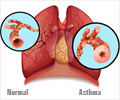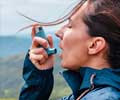The prevalence of asthma and emergency department visits for asthma can vary due to the variation in pollutant levels among different neighborhoods.

‘The asthma care for children living in lower asthma prevalence neighborhoods is much better than those living in high asthma prevalence neighborhoods.’





Concentrations of annual average nitrogen dioxide, particulate matter, and elemental carbon and summer average sulfur dioxide were significantly higher in neighborhoods with higher asthma prevalence than in those with lower prevalence.Nitrogen dioxide and elemental carbon particulate matter were associated with greater prevalence of urgent asthma care. Neighborhood asthma prevalence modified the relationship between pollutant levels and urgent asthma care.
Associations between pollutants and urgent asthma care were observed only among children in lower asthma prevalence neighborhoods.
Researchers concluded that the relationship between street level pollutant levels and urgent asthma care was stronger among children who lived in lower asthma prevalence neighborhoods compared with those with high asthma prevalence.
"The lack of significant relationships between pollution and urgent asthma care in high asthma prevalence neighborhoods suggests that the influence of additional environmental and biological factors may be more influential in those neighborhoods," states lead researcher Dr. Lovinsky-Desir, "yet pollutant exposure modeled at residential street level remained an important predictor of urgent asthma visits in lower asthma prevalence neighborhoods of urban New York City."
Advertisement
Source-Eurekalert















